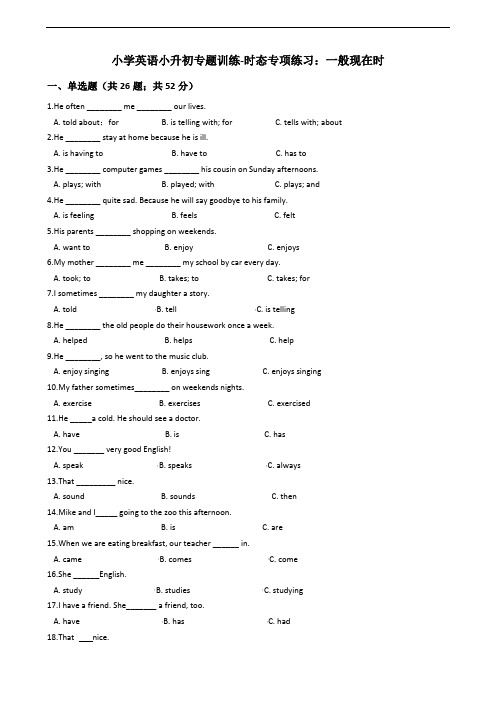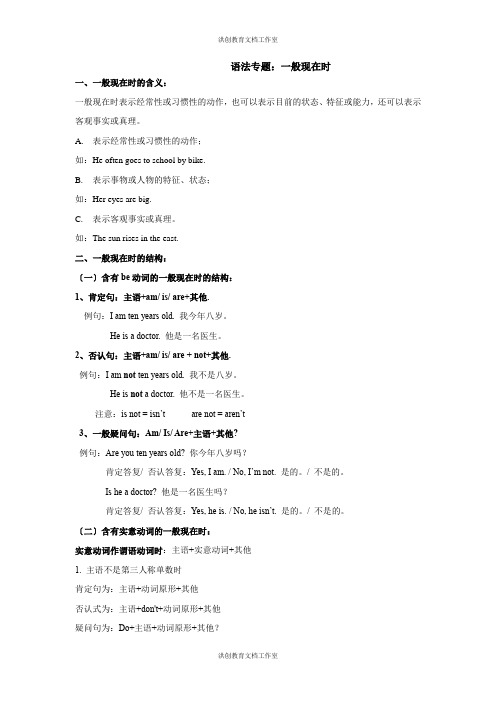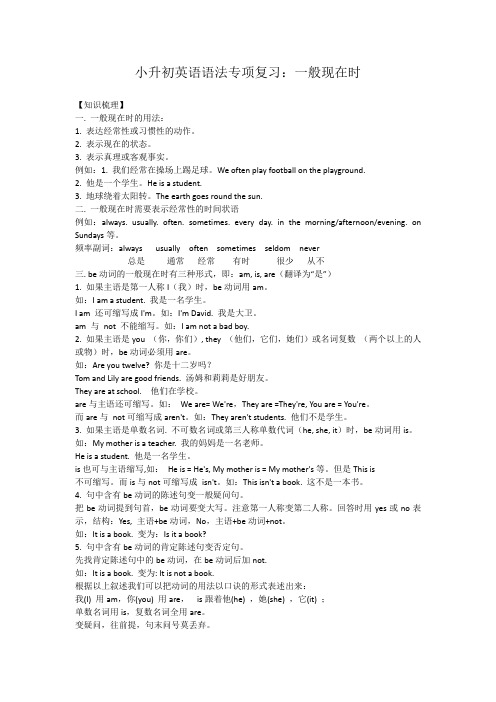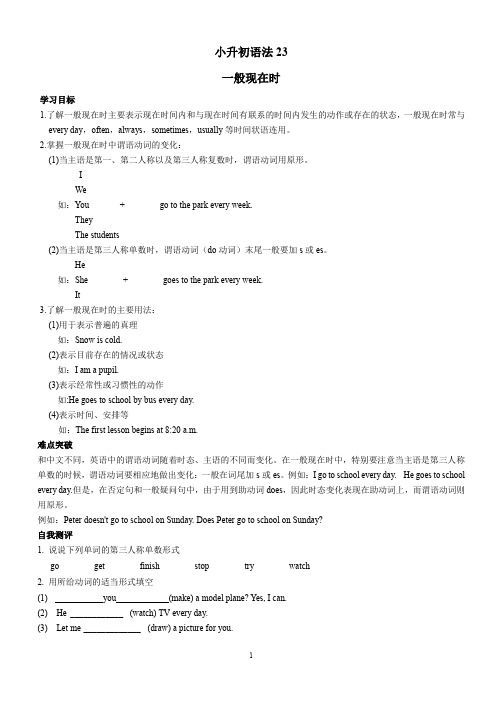陕西省西安市小升初英语专题复习(语法专练):一般现在时
小学英语小升初专题训练-时态专项练习:一般现在时 50题(含答案)

小学英语小升初专题训练-时态专项练习:一般现在时一、单选题(共26题;共52分)1.He often ________ me ________ our lives.A. told about;forB. is telling with; forC. tells with; about2.He ________ stay at home because he is ill.A. is having toB. have toC. has to3.He ________ computer games ________ his cousin on Sunday afternoons.A. plays; withB. played; withC. plays; and4.He ________ quite sad. Because he will say goodbye to his family.A. is feelingB. feelsC. felt5.His parents ________ shopping on weekends.A. want toB. enjoyC. enjoys6.My mother ________ me ________ my school by car every day.A. took; toB. takes; toC. takes; for7.I sometimes ________ my daughter a story.A. toldB. tellC. is telling8.He ________ the old people do their housework once a week.A. helpedB. helpsC. help9.He ________, so he went to the music club.A. enjoy singingB. enjoys singC. enjoys singing10.My father sometimes________ on weekends nights.A. exerciseB. exercisesC. exercised11.He _____a cold. He should see a doctor.A. haveB. isC. has12.You _______ very good English!A. speakB. speaksC. always13.That _________ nice.A. soundB. soundsC. then14.Mike and I_____ going to the zoo this afternoon.A. amB. isC. are15.When we are eating breakfast, our teacher ______ in.A. cameB. comesC. come16.She ______English.A. studyB. studiesC. studying17.I have a friend. She_______ a friend, too.A. haveB. hasC. had18.That nice.A. soundB. soundingC. sounds19.She always _____________ cakes at the weekend.A. makeB. makes20.Mary a very bad cold, so she has to see a doctor.A. makeB. haveC. has21.What ________ Darning ________ at Christmas?A. does; doesB. do; doC. does; do22.He sometimes ______ with his friends.A. playing footballB. play footballC. plays footballD. played football23.I often ________ stories to my little sister.A. readB. readsC. reading24.The earth __________ around the sun.A. goB. goesC. going25.He often ___________ to school by bus.A. goesB. goC. went26.The earth ___________ around the sun.A. goB. goesC. went二、选词填空(词汇运用)(共10题;共14分)27.My mother often ________ (go/goes) to bed at 9:30 pm.28.I usually ________ to school. (walk, walked)29.She often ________(does/did) her homework in the evening.30.Lingling ________ (has/ have) got a new computer.31.The birds ________ (live / lives) in the tree.32.It ________ (say/ says) snakes can't hear.33.My uncle often ________ (go/goes) to work by bus.34.Everyone ________ (need/needs) water.35.The little cat ________ (like/likes) eating fish.36.看图选词并用其适当形式填空。
2020年小升初英语专题复习(语法专练):一般现在时

2020年小升初英语专题复习(语法专练):一般现在时一、单选题(共50题;共100分)1.School is nearly _____________.A. finishedB. finishC. finishes【答案】A【考点】一般现在时,过去分词【解析】【分析】句意:学校快放学了。
本句是一般现在时的被动语态,be+过去分词,A完成,动词过去式或过去分词;B完成,动词原形;C完成,动词单三形式。
故选A.【点评】本题考查了过去分词,注意一般现在时的被动语态构成。
2.Why do you ______________ cups on your heads?A. hadB. haveC. has【答案】B【考点】一般现在时,动词原形,特殊疑问句【解析】【分析】句意:为什么你的头上……杯子?A有,动词过去式;B有,动词原形;C有,动词单三形式,本句是一般现在时是特殊疑问句,谓语动词用原形。
故选B.【点评】本题考查了动词原形,注意牢记一般现在时的特殊疑问句结构句式。
3.He ________ and everyone waits.A. stoppingB. stopsC. stop【答案】B【考点】一般现在时,动词单三式【解析】【分析】句意:他......,每个人等待。
根据and后面句子时态,可知这是叙述事实,句子时态用一般现在时。
句子主语是第三人称单数,谓语动词用单三形式。
B选项正确。
故答案为:B。
【点评】这是考查单词适当形式的题目。
要掌握主谓一致。
4.Amy ___________ a hamburger and a cola.A. wantB. wantsC. wants to【答案】B【考点】一般现在时,动词单三式【解析】【分析】句意:艾米……一个汉堡包和一杯可乐。
本句是一般现在时,主语是第三人称单数,谓语动词用单三形式,A想要,动词原形,排除;B想要,动词单三形式;C想要,want to do sth固定搭配,排除。
小升初英语必考知识点归纳2022陕西西安

8.比较than 前用比较级;as…as之间用原级。如:My mother is two years younger than my father.我妈比我爸年轻两岁。Liu Tao jumps as far as Ben.刘涛跳得和本一样远。
2. 一般现在时表示经常反复发生的事情或动作,常与often, usually, sometimes, always, every day(week year…) on Sundays等词连用。结构是主语+动词原形;当主语为第三人称单数即he,she, it, Tom, my mother, the boy等词时,动词后加s或es.如:We have an English lesson every day.我们每天都要上英语课Do the boys run faster than the girls? Yes, they do.男孩比女孩跑的快吗?是的问句借助于do, does否定句借助于don’t, doesn’t,后面动词一定要还原。
13. 介词介词后要么不加动词,加动词只能加动词ing形式如:be good at running;do well in jumping;
14. 时间介词季节前,月份前用介词in如:in summer;in March具体的哪一天如星期几,几月几日用介词on如:on Saturday; on the second of April; on Wednesday morning在几点钟前用介词at如: at a quarter to four;只在上下午晚上用in如:in the morning/ afternoon/ evening;但在夜间用at night。另:季节,月份和星期前不好加the.小源自初英语必考知识点归纳2022陕西西安
小升初英语讲解时态:一般现在

小升初英语总复习精讲精练之动词时态(1) 一般现在时【精讲】前段时间,我们梳理了小升初英语常考的词法,从今天开始,我们一起看看小升初英语常考的时态。
今天先来复习第一部分:一般现在时。
一般现在时,表示通畅性、规律性、习惯性的动作或状态。
那么在考试中怎样判断句子中应该用什么时态呢?首先我们一起看看一般现在时的关键词。
[关键词]always(总是), often(经常), usually(通常), sometimes(有时), never(从不), every day(每天)/ week(每周)/ month(每个月)/ year(每年), once/ twice/ three times a day / week / month / year(每天/每周/每月/每年一次/两次/三次......)。
如果句子中出现以上关键词,那么这个句子要用一般现在时。
那么一般现在时又有哪些人称之分呢?[人称]1、单三人称:he, she, it以及所有能够用he,she,it所代替的人称。
2、非单三人称:除单三人称以外其他的人称。
为什么在一般现在时中,我们要把人称分为以上两种呢?这也是小升初考试的一个考点,即:在一般现在时中,主语如果是单三人称,谓语动词要在词尾+s或es(动词单三人称的变化规则同名词单数变复数),主语如果是其他人称,谓语动词用原形。
[构成形式]一般现在时的构成形式分为两种:一种是含有be动词,另一种是含有实意动词。
我们一起通过下面两个表格看看这两种形式有什么区别:我们一起看看下面几个例句:1、I drink milk every day. 我每天都喝牛奶。
2、He likes playing tennis.他喜欢打网球。
3、I don’t speak French.我不讲法语。
4、Where is my skirt ?我的裙子在哪里?5、Does he get up early every morning? 他每天都起床很早吗?【精练】一、用括号内所给动词的适当形式填空。
小升初语法辨析一般现在时一般过去时一般将来时(讲义)人教PEP版英语六年级下册

小升初英语语法辨析:一般现在时、一般过去时、一般将来时&专项模拟练习一、一般现在时1.定义:表示经常发生的动作、存在的状态或普遍真理。
2.时间标志词:often(经常)、usually(通常)、always(总是)、sometimes(有时)、every day/week/month/year(每天/ 周/ 月/ 年)等。
3.结构:1.主语(非第三人称单数)+ 动词原形。
例如:You play basketball afterschool.(你放学后打篮球。
)2.主语(第三人称单数)+ 动词的第三人称单数形式。
例如:He playsbasketball after school.(他放学后打篮球。
)4.用法:1.表示经常性或习惯性的动作。
如:I go to school by bike every day.(我每天骑自行车去上学。
)2.表示现在的状态或特征。
如:She is tall and thin.(她又高又瘦。
)3.表示客观事实或普遍真理。
如:The earth moves around the sun.(地球绕着太阳转。
)二、一般过去时1.定义:表示过去某个时间发生的动作或存在的状态。
2.时间标志词:yesterday(昨天)、last week/month/year(上周/ 上个月/ 去年)、ago(……以前)、in + 过去的年份等。
3.结构:主语+ 动词的过去式。
例如:You played basketball yesterday.(你昨天打了篮球。
)4.用法:1.表示过去某个时间发生的动作。
如:I went to the park last Sunday.(我上周日去了公园。
)2.表示过去存在的状态。
如:He was happy yesterday.(他昨天很开心。
)三、一般将来时1.定义:表示将来某个时间要发生的动作或存在的状态。
2.时间标志词:tomorrow(明天)、next week/month/year(下周/ 下个月/ 明年)、in the future(在未来)等。
小升初英语语法专题精讲学案 一般现在时(难度简单)(含答案)

语法专题:一般现在时一、一般现在时的含义:一般现在时表示经常性或习惯性的动作,也可以表示目前的状态、特征或能力,还可以表示客观事实或真理。
A.表示经常性或习惯性的动作;如:He often goes to school by bike.B.表示事物或人物的特征、状态;如:Her eyes are big.C.表示客观事实或真理。
如:The sun rises in the east.二、一般现在时的结构:〔一〕含有be动词的一般现在时的结构:1、肯定句:主语+am/ is/ are+其他.例句:I am ten years old. 我今年八岁。
He is a doctor. 他是一名医生。
2、否认句:主语+am/ is/ are + not+其他.例句:I am not ten years old. 我不是八岁。
He is not a doctor. 他不是一名医生。
注意:is not = isn’t are not = aren’t3、一般疑问句:Am/ Is/ Are+主语+其他?例句:Are you ten years old? 你今年八岁吗?肯定答复/ 否认答复:Yes, I am. / No, I’m not. 是的。
/ 不是的。
Is he a doctor? 他是一名医生吗?肯定答复/ 否认答复:Yes, he is. / No, he isn’t. 是的。
/ 不是的。
〔二〕含有实意动词的一般现在时:实意动词作谓语动词时:主语+实意动词+其他1. 主语不是第三人称单数时肯定句为:主语+动词原形+其他否认式为:主语+don't+动词原形+其他疑问句为:Do+主语+动词原形+其他?肯定答复/否认答复:Yes, 主语+do. / No, 主语+ don’t.例句:I like Chinese.I don’t like Chinese.Do you like Chinese? Yes, I do. / No, I don’t.〔三〕含有情态动词的一般现在时的结构〔以情态动词can为例〕:1、肯定句:主语+can+动词原形+其他.例句:The monkeys can climb trees. 猴子会爬树。
小升初英语专题复习(语法专练)一般现在时

小升初英语专题复习(语法专练):一般现在时一、单选题(共50题)1.School is nearly _____________.A. finishedB. finishC. finishes2.Why do you ______________ cups on your heads?A. hadB. haveC. has3.He ________ and everyone waits.A. stoppingB. stopsC. stop4.Amy ___________ a hamburger and a cola.A. wantB. wantsC. wants to5.That's a hamburger. It __________ good.A. lookB. looksC. looking6.— Does your pen pal _____________ football every weekend?— Yes, he does. He likes _____________ sports.A. plays; playingB. play; playingC. plays; plays7.My father works very hard and _____________ healthy.A. staysB. stayingC. stay8.Venice_______ many rivers.A. havingB. haveC. has9.She is watching TV but the door ________. Her mum comes home.A. is openingB. opensC. opened10.Tingting is in America with her grandma. She really ________ her parents.A. missB. missingC. misses11.Everyone ________ Happy New Year to each other at Spring Festival.A. sayB. saysC. saying12.Sam stops playing the drums, everyone waits. Then he ________ again.A. tryB. triesC. trying13.The girl ________ hard at school.A. studyB. studyingC. studies14.It often ________ in Shanghai.A. is rainingB. rainedC. rains15.In spring, the trees ________ green.A. getB. getsC. got16.He often ________ stories to his little brother.A. readB. readsC. reading17.He usually on weekends.A. reads booksB. sleptC. watch TV18.Helen usually ______her homework after super.A. doesB. doC. did19.He often to school by subway, but he by car yesterday.A. goes; goesB. goes; wentC. went; goes20.— Does your uncle ________________ in Ningbo, Jack?— No. He ________________ in Y uyao.A. lives; liveB. lives; livesC. live; lives21.— _______________ Oliver visit his grandparents every weekend?— Yes, he loves them very much.A. DoB. DoesC. Is22.— Where does your uncle ______________?— He ______________ in a car factory.A. work; workB. work; worksC. works; work23.Mary lives in the USA. But she likes _______ Chinese food and she often _______ Chinese,A. cooks; studies.B. cooking; studiesC. cooking; studying24.He often ______________ word puzzles on the weekends.A. doesB. doC. did25.— What does this sign ?— It you can't smoke here.A. means; meanB. mean; meansC. mean; meanD. means; means26.It _________ me fifteen yuan to buy apples.A. takeB. takesC. cost27.The flower _________red.A. getB. getsC. got28.You ______ tired.A. lookB. looksC. looking29.He always ______it very well.A. playB. playsC. played30.Why ________ he always have so many questions?A. doB. isC. does31.She _________ up the phone and calls for food.A. takesB. takeC. makes32.She_________ a phone call to her mum.A. makeB. makesC. mades33.It _________ me fifteen yuan to buy the book.A. takeB. takesC. cost34.He often ________ me ________ our lives.A. told about;forB. is telling with; forC. tells with; about35.He ________ computer games ________ his cousin on Sunday afternoons.A. plays; withB. played; withC. plays; and36.He ________ quite sad. Because he will say goodbye to his family.A. is feelingB. feelsC. felt37.My mother ________ me ________ my school by car every day.A. took; toB. takes; toC. takes; for38.Our school ________ music festival every year.A. will haveB. haveC. has39.He ________, so he went to the music club.A. enjoy singingB. enjoys singC. enjoys singing40.He ________ the old people do their housework once a week.A. helpedB. helpsC. help41.My father sometimes________ on weekends nights.A. exerciseB. exercisesC. exercised42.The girl is very ________. She ________ curly yellow hair.A. pretty;hasB. handsome; hasC. prey;have43.Sometimes my grandma ___________ shopping on Sundays.A. wentB. goesC. go44.My father is a teacher. He us Chinese.A. teachB. teachesC. teaching45.Ann _______up early in the morning every day.A. to getB. getC. gets46.All skin colours from melanin.A. comeB. comesC. coming47.When we are eating breakfast, our teacher ______ in.A. cameB. comesC. come48.That nice.A. soundB. soundingC. sounds49.Linda often ________________ breakfast at home. But yesterday she ________________ it in the restaurant.A. haves, hadB. has, hadC. had, has50.The snake ________ angry.A. getB. getsC. getting答案解析部分一、单选题1. A解:句意:学校快放学了。
小升初小学英语语法总复习现在进行时一般现在时

wash finish
washes finishes
catch
go do
catches
goes does
If the verb ends in -y, we have to change the letter y into ies.
tidy study
tidies studies
carries
carry
Do Does
I/you/we/they He/she/it
do?
e.g. Do you sing? e.g. Does Sam eat fish?
Now you try.
____ he sweep the floor? Does
Do you water the plants? ____
_____ you make the bed? Do
doesn’t like sweets. e.g. I like sweets. She ____________ 1 She runs fast. I ____________ don’t run fast.
Now you try
doesn’t play 2 Paul plays football but he ____________ basketball.
need to change the verb.
He waters the plants every day. She walks the dog every day. My mum cooks us dinner every day.
When we talk about a third person (he/she/it/名单),
现在进行时的含义与构成
小升初英语语法专项复习:一般现在时

小升初英语语法专项复习:一般现在时【知识梳理】一. 一般现在时的用法:1. 表达经常性或习惯性的动作。
2. 表示现在的状态。
3. 表示真理或客观事实。
例如:1. 我们经常在操场上踢足球。
We often play football on the playground.2. 他是一个学生。
He is a student.3. 地球绕着太阳转。
The earth goes round the sun.二. 一般现在时需要表示经常性的时间状语例如:always. usually. often. sometimes. every day. in the morning/afternoon/evening. on Sundays等。
频率副词:always usually often sometimes seldom never总是通常经常有时很少从不三. be动词的一般现在时有三种形式,即:am, is, are(翻译为“是”)1. 如果主语是第一人称I(我)时,be动词用am。
如:I am a student. 我是一名学生。
I am 还可缩写成I'm。
如:I'm David. 我是大卫。
am 与not 不能缩写。
如:I am not a bad boy.2. 如果主语是you (你,你们), they (他们,它们,她们)或名词复数(两个以上的人或物)时,be动词必须用are。
如:Are you twelve? 你是十二岁吗?Tom and Lily are good friends. 汤姆和莉莉是好朋友。
They are at school. 他们在学校。
are与主语还可缩写。
如:We are= We're,They are =They're, You are = You're。
而are与not可缩写成aren't。
如:They aren't students. 他们不是学生。
小升初语法23-一般现在时

小升初语法23一般现在时学习目标1.了解一般现在时主要表示现在时间内和与现在时间有联系的时间内发生的动作或存在的状态,一般现在时常与every day,often,always,sometimes,usually等时间状语连用。
2.掌握一般现在时中谓语动词的变化:(1)当主语是第一、第二人称以及第三人称复数时,谓语动词用原形。
IWe如:You + go to the park every week.TheyThe students(2)当主语是第三人称单数时,谓语动词(do动词)末尾一般要加s或es。
He如:She + goes to the park every week.It3.了解一般现在时的主要用法:(1)用于表示普遍的真理如:Snow is cold.(2)表示目前存在的情况或状态如:I am a pupil.(3)表示经常性或习惯性的动作如:He goes to school by bus every day.(4)表示时间、安排等如:The first lesson begins at 8:20 a.m.难点突破和中文不同,英语中的谓语动词随着时态、主语的不同而变化。
在一般现在时中,特别要注意当主语是第三人称单数的时候,谓语动词要相应地做出变化:一般在词尾加s或es。
例如:I go to school every day. He goes to school every day.但是,在否定句和一般疑问句中,由于用到助动词does,因此时态变化表现在助动词上,而谓语动词则用原形。
例如:Peter doesn't go to school on Sunday. Does Peter go to school on Sunday?自我测评1. 说说下列单词的第三人称单数形式go get finish stop try watch2. 用所给动词的适当形式填空(1) you (make) a model plane? Yes, I can.(2) He ____________ (watch) TV every day.(3) Let me _____________ (draw) a picture for you.(4) How _____________ your mother____________ (go) to work every day?(5) They like _____________ (listen) to the music.(6) I (be) a boy of Grade Four.3. 选择填空( ) (1) He eats his breakfast 7:00 in the morning.A. onB. inC. at( ) (2) How many bananas in the bag?A. is thereB. are thereC. they are( ) (3) What ________ you want?A. doB. haveC. does( ) (4) These shirts are so nice but ________ quite cheap.A. theyB. it isC. they are( ) (5) Does Mike _________ ice-cream?A. likeB. likesC. liking( ) (6) What _________ Linda got?A. hasB. haveC. does( ) (7) Danny wants a new pen. He __________like his old one.A. doesn'tB. isC. do( ) (8) Can I have some milk, please? Here you __________ .A. isB. areC. some( ) (9) It's not hot now. Please the door.A. closeB. nodC. open( ) (10) What _________ your mother need?A. doB. doesC. has4. 听短文,填入所缺的词Jimmy and I twins. Every day we school on foot. We study in the same school, we in the same class. We lunch at school. We go home at 5 o' clock.(1) What's my friend's name?(2)What time does Meg get up?(3)What does Meg eat for breakfast?(4)Does Meg go to school at seven o'clock?(5)What does Meg do at nine o'clock every evening?趣味阅读A StoryOne morning, the hare and the tortoise have a race. At first the hare runs very fast. He is far ahead of the tortoise. He sits under a tree and soon he falls asleep. The tortoise keeps on running hard. At last the tortoise wins the race. He says to the hare: "Mr. Hare, you can run faster than me. But I got here first." The hare's face turns red.根据短文内容回答问题1. Who is having a race?2. Does the hare run fast at first?3. At last who wins the race?_______________________________________________________________________________________4. Why can the tortoise win the race?5. How does the hare feel?Keys:1. 略。
小升初英语专项复习:一般现在时

一般现在时一、定义1.表示事物或人物的特征、状态。
如:The sky is blue.天空是蓝色的。
2.表示经常性或习惯性的动作。
如:I get up at six every day.我每天六点起床。
3.表示客观现实。
如:The earth goes around the sun.地球绕着太阳转。
二、时间状语1.频度副词:always>usually>often>sometimes>never2.频度词组:every morning/night/evening/day/week/year,3.其他:on Sundays,at weekends三、动词的变化规则1、大多数动词在词尾加“S”在清辅音后发音为[s],在浊辅音及元音后发音为[z]。
如:①stop-stops[s]make-makes[s]②read-reads[z]play-plays[z]2、以辅音字母加“y”结尾的,要先将“y”变为“i”,然后在加“es”读[iz]如:fly-flies[z]carry-carries[z]study-studies[z]worry-worries3、以“s,x,ch,sh”结尾的,在词尾加“es”,发音为[iz]如:teach-teaches[iz]watch-watches[iz]4、以“o”结尾的动词,加“es”,读[z]如:go-goes[z]do-does[z]四、结构1.be动词:主语+be(am,is,are)+其它。
如:I am a boy.我是一个男孩。
2.行为动词:主语+行为动词(+其它)。
如:We study English.我们学习英语。
当主语为第三人称单数(he,she,it)时,要在动词后加"-s"或"-es"。
如:Mary likes Chinese.玛丽喜欢汉语。
注意:一般现在时经常和频率副词连用。
五、句式1.谓语动词为be动词的。
小升初英语语法之一般现在时

小升初英语衔接--一般现在时一.一般现在时的功能:1.表示事物或人物的特征、状态:如:天空是蓝色的。
2.表示经常性或习惯性的动作:如:我每天六点起床。
3.表示客观现实:如:地球绕着太阳转。
二. 一般现在时的构成:1. be动词:主语+be( / / )+其它。
如:I am a boy.我是一个男孩。
2.行为动词:主语+行为动词(+其它)。
如:We study English.我们学习英语。
当主语为第三人称单数时,要在动词后加" "或" "。
如:Mary Chinese.玛丽喜欢汉语。
三.一般现在时的变化:1. be动词的变化。
(1) 否定句:主语+ be + not +其它。
He is a farmer. (变为否定句)(2) 一般疑问句:Be +主语+其它。
如:回答:(3) 特殊疑问句:疑问词+一般疑问句。
如:Where is my bike?2.行为动词的变化。
(1) 否定句:主语+ don't( doesn't ) +动词原形(+其它)。
当主语为第三人称单数时,要用doesn't构成否定句。
(2) 一般疑问句:Do( Does ) +主语+动词原形+其它。
(3) 当主语为第三人称单数时,要用does构成一般疑问句。
I play football every day.(改为否定句)(改为一般疑问句及回答)He plays football every day.(改为否定句)(改为一般疑问句及回答)(4)特殊疑问句:疑问词+一般疑问句。
如:How does your father go to work?四.三单做主语时,动词加s的变化规则:1.一般情况下,直接加-s:cook-- like-- want2.以s.x.sh.ch.o.结尾,加-es:wash-- watch-- go-- miss--3.以辅音字母+y结尾,变y为i,在加-es:study-- fly-- carry--4.不规则的有,have-- be--实战演练一、写出下列动词第三人称单数的变化形式;be-- have-- come-- go--stay-- teach-- write-- take--study-- watch-- fly -- play--二、用括号内动词的适当形式填空。
小升初英语一般现在时必考知识点

小升初英语一般现在时必考知识点一般现在时是英语中最基础和最常用的时态之一,它表示当前的动作、状态或者经常性的、习惯性的行为。
在小升初英语考试中,一般现在时是必考的知识点之一,下面将详细介绍一些相关的考点和规则。
1.一般现在时的构成一般现在时的肯定句结构是“主语 + 动词原形”,例如:I play soccer every day.(我每天踢足球。
)其中,主语可以是第一人称单数(I)、第二人称单数(you)、第三人称单数(he/she/it),或者任何人称的复数形式。
2.第三人称单数的变化规则在一般现在时中,第三人称单数的动词需要加上“-s”,例如:He plays soccer every day.(他每天踢足球。
)但是需要注意的是,当动词以“s, sh, ch, x, o”结尾时,要加上“-es”,例如:She watches TV every evening.(她每晚看电视。
)当动词以辅音字母加“y”结尾时,将“y”改为“i”,再加上“-es”,例如:He studies English every morning.(他每天早上学英语。
)3.否定句和疑问句的构成否定句的构成是在助动词“do/does”的后面加上“not”,再加上动词原形,例如:I do not play soccer.(我不踢足球。
)或者简写为:I don't play soccer. 疑问句的构成是把助动词“do/does”放在句首,然后把主语和动词的位置互换,例如:Do you play soccer?(你踢足球吗?)或者简写为:Does he play soccer?(他踢足球吗?)4.经常性、习惯性行为5.客观真理和固定事实一般现在时还用来表达客观真理和固定事实,在这种情况下,动词没有人称和数的变化。
常见的动词有:believe(相信)、know(知道)、think(认为)、understand(理解)、like(喜欢)等,例如:Water boils at 100 degrees Celsius.(水在100摄氏度时烧开。
小升初英语语法解析:一般现在时

小升初英语语法解析:一般现在时小升初的英语考试内容涉及并不多,下面就是小编给大家带来的小学英语语法一般现在时的语法解析,希望能帮助到大家!小升初英语语法解析:一般现在时一:定义一般现在时 (The simple present tense) :一般现在时表示现在经常反复发生的动作,存在的状态或习惯性的动作的时态。
二、一般现在时的用法:1.表示经常或习惯性的动作。
常与often(经常), always(总是), sometimes(有时), every day(每天)on Sundays/Mondays 等表示频度的时间状语连用。
一般现在时的时间状语有:today, often, sometimes, always, usually, every day ( week, month, year,…), this year, once a week ( month, year, …)例句:I get up at 6 o’clock every day. 我每天早上6点钟起床。
He often goes to school by bike. 他经常骑自行车去学校。
2. 表示客观事实,普遍真理。
例句:Two and two is four. 二加二等于四。
The earth moves around the sun. 地球绕着太阳转。
三、一般现在时的结构:一般现在时用行为动词的原形,但第三人称单数作主语时,动词的词尾要加-s 或 - es。
以下将对一般现在时的肯定句、否定句、疑问句及其答语的构成加以说明:A、当谓语是be动词时,构成为:肯定句:主语 + be动词 ( am, is, are ) + 其他。
I am a student.否定句:主语+be动词 ( am, is, are ) + not +其他。
I am not a student.疑问句:be动词 ( am, is, are ) + 主语 + 其他? Am I a student?肯定回答:Yes,主语 + be动词 ( am, is, are ) Yes, I am.否定回答:No,be动词 ( am, is, are ) + not. No, I am not.B、当谓语是行为动词时,构成有两种:(1)当主语为非第三人称单数时:肯定句:主语+动词原形+其它We watch TV at home.否定句:主语+don't+动词原形+其它We don’t watch TV at home.一般疑问句:Do+主语+动词原形+其它Do we watch TV at home?肯定回答:Yes,主语+doYes, we do.否定回答:No,主语+don'tNo, we don’t.(2)当主语是第三人称单数时:肯定句:主语+动词s+其它She reads books.否定句:主语+doesn't+动词原形+其它She doesn’t read books.一般疑问句:Does+主语+动词原形+其它Does she read books?肯定回答: Yes,主语+does.Yes, she does.否定回答: No,主语+doesn't.No, she doesn’t.四、动词加-s 或-es (动词第三人称单数):当主语是第三人称单数时,谓语动词需用动词的“三单变化”加-s 或-es。
小升初英语一般现在时语法知识复习指导

小升初英语一般现在时语法知识复习指导导语:在考试前加紧复习,不可松懈。
正所谓“临阵磨枪不亮也光。
”,但这也是建立在平时的认真踏实学习的根底上的。
下面是为大家收集的小升初英语一般现在时语法知识,供大家参考。
一:一般现在时:表示经常性的事情。
时间状语:often经常, usually通常, always总是, every每个, sometimes有时,at…在几点钟只有第三人称单数用动词三单,其余动词均用原形三单变化:多数在动词后加s play—plays like—likes 以s,x,sh,ch,o结尾的动词加es go—goes wash--washes 以辅音字母加y结尾,把y改i 再加es fly—flies二:根本构造:动词原形(如主语为第三人称单数,动词上要改为第三人称单数形式)三:否认形式:am/is/are+not;此时态的谓语动词假设为行为动词,那么在其前加don't,如主语为第三人称单数,那么用doesn't,同时复原行为动词。
四:一般疑问句:把be动词放于句首;用助动词do提问,如主语为第三人称单数,那么用does,同时,复原行为动词。
五:但是,动词to be 和to have 的一般现在时的形式特殊如下:一般动词的词形变化 To be 的词形变化 To have 的词形变化I know it I am a student I have a pen.You know it. You are a student You have a penHe (she) knows it. He (she) is a student. He (she)has a pen.We (you,they) know it. We (you,they) are students. We (you,they) have pens.。
2023小升初英语语法专题(知识点讲解与考题精练) 专题18 一般现在时

小升初语法第18讲:一般现在时【考点解读】英语中,人们在句子表达的过程中,随着时间的变化,谓语动词的形式会发生相应的变化,称之为时态。
动词时态共有十六种,小升初常考的时态有四种:一般现在时;一般将来时;一般过去时;现在进行时。
小升初考试中要求掌握四种时态的概念、动词变化规则、标志词、句型变化等,重点民办学校在分班考中都会涉及四种时态的用法。
【知识讲解1】小学阶段时态汇总【知识讲解2】一般现在时1.现阶段存在的状态;现在时刻内经常性、习惯性的动作。
2.用法(1)经常性或习惯性的动作。
例如:It seldom snows in Suqian now. 宿迁现在已经很少下雪了。
(2)现在的情况或状态。
例如:He loves sports. 他喜欢运动。
(3)表示现在的能力、特征、职业等。
如:I am a teacher. 我是一名教师。
(4)表示客观真理、科学事实、格言以及不受时间限制的客观存在。
如:Light travels faster than sound. 光比声音传播得更快。
(5)在if, when, as soon as, until, after, before等连接词引导的时间或条件状语从句中,从句中谓语动词要用一般现在时,主句要用将来时。
例如:Turn off the light before you leave. 离开前请关掉灯。
We will start as soon as you are ready. 你一准备好,我们就会出发。
(6)表示按规定、计划、安排或时间表将要发生的情况,如用于火车、飞机等定期定点运行的交通方式中,表示按时刻表安排将要发生的动作或状态,涉及到一些动词,如:begin, start, stop, arrive, come, go, leave,return, open, close, be等代替将来时。
如:My plane leaves at 11 a.m. tomorrow. 我的飞机明天上午11点起飞。
小升初语法专题复习-一般现在时态(讲义)-人教PEP版英语六年级下册

小升初语法专题复习一般现在时态一、知识点讲解:重点、考点:(一)一般现在时态的概念表示通常性、规律性、习惯性、真理性的动作或状态,或者动作有时间规律发生的事件的一种时间状态。
有以下两种情况:1、表示经常性或习惯性的动作或存在的状态。
常与表示频度的时间状语连用。
如:1). always(总是), usually(通常), often(经常), sometimes(有时), seldom(很少), never(决不),2). every day/Friday/week/weekend/month/summer/year, 每天/周五/周/周末...3). on Sunday/Sunday morning, 4). in the morning/afternoon/evening等。
例如:I often go to school on foot. 我经常走路去上学。
My father usually goes to work by car.我爸爸通常开车去上班。
She gets up at 6:00 every day. 她每天6点起床。
2、表示个人的性格能力、客观事实或普遍真理。
例如:He likes playing football. 他喜欢踢足球。
I can speak English. 我会说英语。
The earth goes around the sun. 地球围着太阳转。
(二)一般现在时态的句子运用:1)肯定句:1. 主语+be动词+其他例:I am a student. They are my friend.2. 主语+情态动词can+动词原形+其他例:She can dance.【扩展】be动词是指:am, is, are, (was, were)情态动词有:can (会,可以,能够), could (会,可以,能够),may (可能) should (应该), must (一定,必须)....3. 主语+实义动词/实义动词+其他例:They go home by bus.She has a dancing class.【注意】口诀:主三单,动单三;Mary likes maths class very much.主非三单,动原形。
2023年小升初六年级英语一般现在时和动词变化的专题复习

六年级下册英语专题(一般现在时)一般现在时一、一般现在时的概念和应用:1.表示经常性的动作。
如:I eat breakfast every day.我每天吃早餐。
2.表示现在存在的一种状态。
如:I am a student.我是一名学生。
3.表示客观事实:The earth turn around the sun .地球绕着太阳转。
二、标志性词语:一般现在时常与often(经常);sometimes(有时);always(总是);usually(通常)等副词连用,也经常与every day(每天);every week(每周);every month(每月);every term(每学期);every year(每年);once a week(一周一次);twice a year(一年两次)等时间状语连用。
三、其他人称称与第三人称的对比:其他人称:三单:I have an new English teacher. He has an new English teacher..We often go to school by bus. She goes to school on foot.(归纳总结:在一般现在时中,其他人称动词用原形,三单要变化。
)四、动词的第三人称规则变化小诗:(1)三单后有变化,一般词尾加—s;如:look-looks(2)以s. x. sh. ch. o结尾,全加-es,如watch-watches, go-goes(3)“辅y”去“y”加”ies”如:study-studies(4)只“有“have变has五、-否定句、一般疑问句、特殊疑问句:(1) be动词的变化。
否定句:方法:直接在be的后面加not。
如:He is a worker. →He is not a worker.一般疑问句:方法:直接把be放在主语的前面,其余位置不变。
如:They are hard-working. →Are they hard-working?特殊疑问句:疑问词+一般疑问句。
- 1、下载文档前请自行甄别文档内容的完整性,平台不提供额外的编辑、内容补充、找答案等附加服务。
- 2、"仅部分预览"的文档,不可在线预览部分如存在完整性等问题,可反馈申请退款(可完整预览的文档不适用该条件!)。
- 3、如文档侵犯您的权益,请联系客服反馈,我们会尽快为您处理(人工客服工作时间:9:00-18:30)。
陕西省西安市小升初英语专题复习(语法专练):一般现在时
姓名:________ 班级:________ 成绩:________
小朋友,带上你一段时间的学习成果,一起来做个自我检测吧,相信你一定是最棒的!
一、单选题 (共11题;共22分)
1. (2分) Amy usually at 6:30 in the morning.
A . get up
B . goes to bed
C . gets up
2. (2分) It is eraser.
A . a
B . the
C . an
3. (2分) Look the pictures.
A . up
B . in
C . at
4. (2分) (2018六上·温州期末) My uncle works in a factory.He is a .
A . worker
B . doctor
C . pilot
5. (2分)—Is that ________ sweater?
—No,it isn't.
A . you
B . your
6. (2分) (2016三上·宝山期中) —________ you Eddie?
—No,___________.
A . Are,I am
B . are,I'm not
C . Are,I'm not
7. (2分) She always _____________ cakes at the weekend.
A . make
B . makes
8. (2分) (2019六上·硚口期末) I will _______ more listening and reading.
A . do
B . does
C . doing
9. (2分) Jack,________ back at 8 o'clock.
A . come
B . coming
C . is coming
D . comes
10. (2分) I'm . I want .
A . thirsty;drink
B . thirsty;to eat
C . thirsty;to drink
11. (2分) This________ a Tshirt.
A . am
B . is
C . are
二、填空题 (共9题;共11分)
12. (1分) It's cool in autumn. I ride my bike. ________
13. (1分)给图片配上相应的句子。
A. I think I can ski(滑雪).
B. I like to skate.
C. We play with the snow in winter.
D. She likes to make a snowman.
E. My sister likes to run.
(1)________
(2)________(3)________(4)________
(5)________
14. (1分)看图根据提示,写一写
(1)
________
(2)
________
(3)
________
15. (1分) The chairs are ________ (their).
16. (1分) I ________ on my uncle's farm in autumn.
17. (1分) We have English class________10 :00.
18. (1分) Sam________(not brush) his teeth every day.
19. (2分) Wed.
It will ________ on Wednesday. Tom ________.
20. (2分) Who can help ________ (I)with my heavy box?
参考答案一、单选题 (共11题;共22分)
1-1、
2-1、
3-1、
4-1、
5、答案:略
6-1、
7-1、
8-1、
9-1、
10-1、
11-1、
二、填空题 (共9题;共11分)
12-1、
13-1、
13-2、
13-3、
13-4、
13-5、
14-1、
14-2、
14-3、
15-1、
16-1、17-1、18-1、19-1、20-1、。
